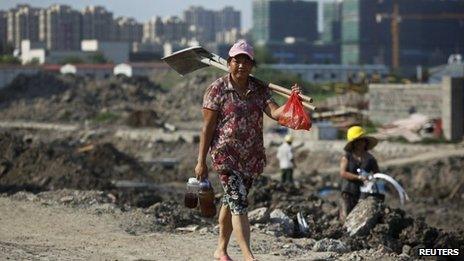Q&A: China's Third Plenum
- Published

Economic reform and a widening wealth gap are key issues for China's leaders
As China's top leaders prepare for the Third Plenum, the BBC looks at why the meeting matters and how it came to be such a significant economic and political event.
Q: What is the party plenum?
The Chinese Communist Party is the world's largest political party. Its constitution stipulates that the party holds a National Congress every five years. Delegates gather in Beijing to attend it. One of their jobs is to elect the Central Committee, the party's highest decision-making body, and its anti-corruption watchdog, the Central Discipline Commission.
Each Central Committee is numbered sequentially, adopting the number of the congress that elects it. As the congress which was convened last November was the 18th, so the 18th Central Committee is now in office.
Its 376 members - who occupy top posts in the party, government and military - meet in Beijing once or twice a year until a new National Congress convenes. The meetings are officially known as plenums - which are also numbered sequentially. The upcoming plenum, from 9-12 November, is the Third Plenum of the 18th Central Committee.
It is the plenums, rather than the party's National Congress or even the top legislature, the National People's Congress, that really matter in Chinese politics. The outcomes of some of the plenums have fundamentally changed the course of history in China.
Q: Why is the Third Plenum significant?
Historians attribute it to the Third Plenum of the 11th Central Committee in 1978 when China, under Deng Xiaoping, embarked on economic reform and opened a door to the outside world.
In 1977, a year after the death of Mao Zedong, Mr Deng was "rehabilitated" after being purged during the Cultural Revolution.
The 10th Central Committee was in office at the time and at its much-delayed third plenum in the summer of 1977 Mr Deng was restored to his former party and state posts.
In August 1977, the 11th National Congress elected the 11th Central Committee. After an intense power struggle, Mr Deng ousted Hua Guofeng, Mao Zedong's chosen successor, and rose to a position of supreme power, equal to if no less than that enjoyed by Mr Mao.
On 18 December 1978, the party's 11th Central Committee held its Third Plenum. Mr Deng's economic reform and open-door policy was adopted. China has since prioritised a modernisation that is ruthlessly pragmatic. The plenum is seen as the catalyst for the transformation of what was an economic backwater into the world's second-largest economy.
It was held in a nondescript hotel in western Beijing in a bitterly cold winter. State media heaped praise to the meeting and said spring had already come at that time. They almost ran out of superlatives.
A tradition has since been established. Generations of leaders have used the Third Plenum to launch far-reaching reforms.
When a new generation of leaders take power, the Third Plenum is normally held a year after they assume office, giving them enough time to consolidate power, study various proposals and reach consensus.
The party has held six such plenums after the meeting in 1978, with each marking major turning points in the political and economic history of modem China.
Q: What can we expect from this Third Plenum?
It has been a year since President Xi Jinping took office. As he is expected to be in power for 10 years, this will be his first Third Plenum.
Under his predecessor Hu Jintao, China has developed into the world's second largest economy. But now its export-driven growth has slowed down - with fears for a knock-on effect on social stability.
Meanwhile rampant official corruption, a widening gap between rich and poor, and environmental degradation continue to cause public discontent.
The country's political system has grown inadequate for dealing with the needs of its economy and society, as a rising number of mass protests has shown.
The party has released few concrete details about the agenda. But its mouthpiece, the People's Daily, quoting senior leaders, has said the plenum will launch "a comprehensive reform plan... and its scope and impact will be unprecedented".
Speculation is rife that the meeting will see major steps taken to overhaul the economy, but it is unlikely that the party will embark on political reform.
"The upcoming plenum will be a huge disappointment if you want to see the party engage in political liberalisation," said He Ping, a prominent US-based analyst on the Chinese Communist Party.
Recent signals from the party all indicate that it is determined to continue its authoritarian rule and will repulse challenges, Mr He told the BBC.
Whatever the outcome, one thing is clear. The meeting will offer an indication of how Xi Jinping intends to lead China in the next decade.
- Published4 November 2013
- Published26 October 2013